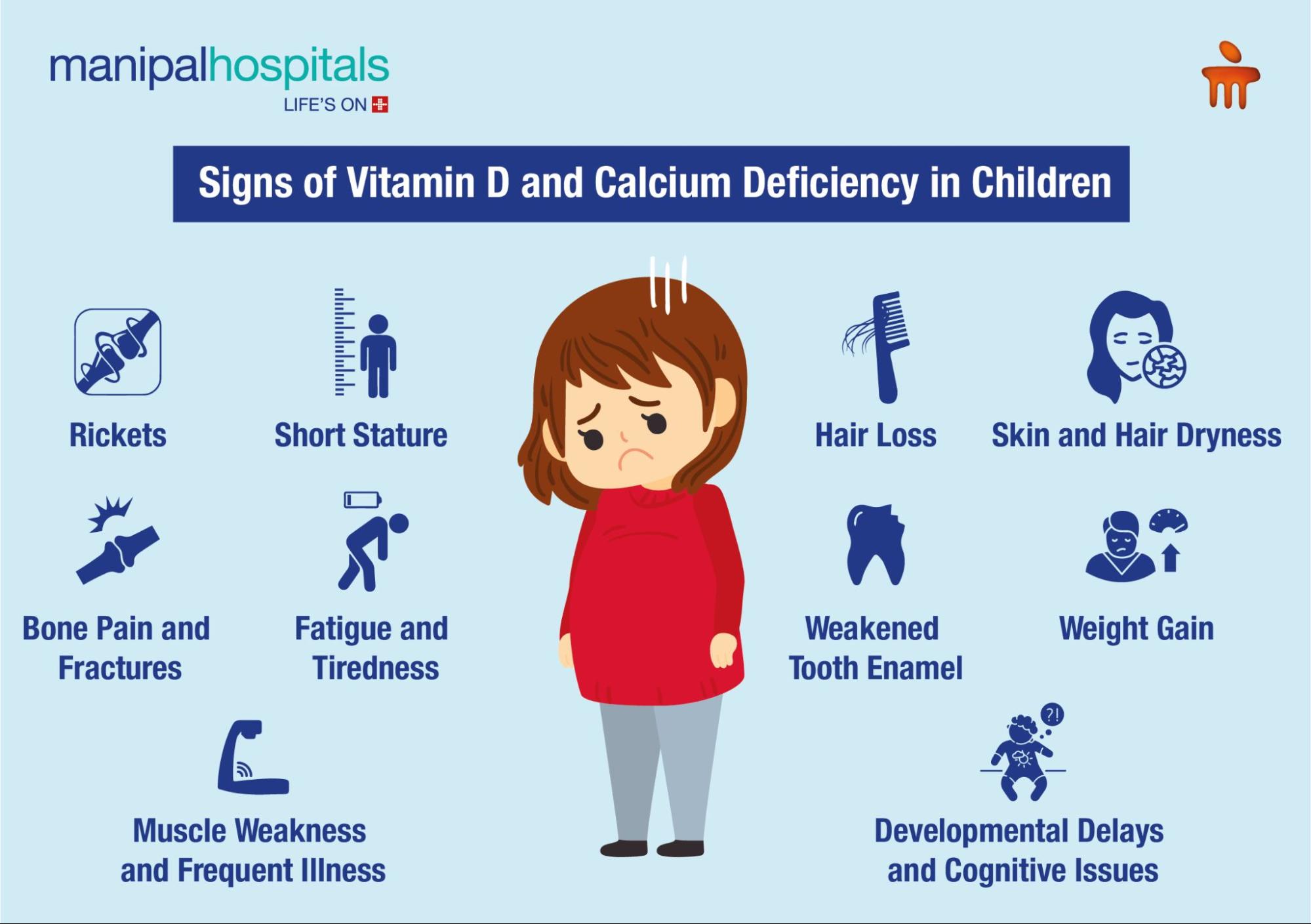
Vitamin D and calcium are essential nutrients that work together to support strong bones, healthy teeth, and overall well-being. Despite abundant sunlight, approximately 490 million people in India are vitamin D deficient, with 31% of them being children and adolescents. Additionally, many Indian children have a habitually low intake of calcium. Childhood is a critical period for bone development, and a lack of adequate dietary intake, sunlight exposure, or certain medical conditions can increase the risk of exhibiting vitamin D and calcium deficiency symptoms. This blog highlights 14 signs of vitamin D and calcium deficiency to help you recognise the early warning signs and take timely action.
Synopsis
How Do Vitamin D and Calcium Help With Child Development?
Vitamin D promotes the health of bones by helping absorb calcium from food. It also helps improve muscle function and immune system response. Calcium, being an abundant mineral in the body, helps in the hardening and strengthening of the bones. Calcium gets absorbed from the small intestine in the presence of vitamin D. Thus, vitamin D deficiency could lead to a low level of calcium in the blood, causing the calcium to be released from bone, leading to weak and fracture-prone bones.
Why Do Kids Develop Vitamin D and Calcium Deficiency?
-
Low dietary consumption: Not consuming enough vitamin D and calcium causes a deficiency. Mainly caused by inadequate intake of milk and vitamin D supplements.
-
Inadequate sunlight exposure: Sunlight helps your body make vitamin D. Children who spend most of their time indoors or those living in cold climates are prone to deficiencies.
-
Insufficient supplementation: Breastfed babies who are not given adequate vitamin D supplements can develop a deficiency.
-
Medical conditions: Children with conditions like coeliac disease, Crohn’s disease, and kidney disease may develop vitamin D deficiency symptoms. Rarely, hyperparathyroidism causes calcium deficiency in children.
14 Signs of Vitamin D and Calcium Deficiency in Children

-
Rickets: Extreme vitamin D deficiency can lead to rickets, a condition that causes growth abnormalities and joint deformities. The condition is common in babies, young children, and adolescents.
-
Bone pain: Some children with vitamin D deficiency develop pain in weight-bearing joints, such as pain in the knees or in the back, calves, and thighs.
-
Bone fractures: Children with long-standing low calcium levels are prone to fractures even with no sign of illness. Low vitamin D levels can disrupt calcium absorption in the body, contributing to bone fractures.
-
Short stature: Vitamin D and calcium deficiency cause bowed or bent bones.
-
Fatigue and tiredness: Low vitamin D and calcium levels can cause the child to be tired or even lead to fatigue. Supplementation with vitamin D may help reduce fatigue.
-
Frequent illness: Vitamin D deficiency can increase the incidence and severity of illnesses.
-
Hair loss: Vitamin D plays an important role in the hair cycle; therefore, its deficiency could lead to slow hair growth.
-
Skin and hair dryness: Prolonged calcium deficiency can cause skin dryness, brittle nails, coarse hair, alopecia, and eczema.
-
Weakened tooth enamel: Low vitamin D and calcium levels can weaken your teeth, increasing your susceptibility to cavities, fractures, periodontal diseases, and decay.
-
Muscle pain and weakness: Low vitamin D levels can increase your likelihood of developing loss of muscle tone, muscle loss, weakness, and pain. Losing muscle strength can also increase stress on your back and neck muscles, resulting in back pain. Calcium deficiency also causes numbness and tingling in the hands, arms, feet, legs, and around the mouth.
-
Health problems: Low calcium levels can cause tetany, cardiomyopathy, or seizures.
-
Developmental delays: Children with vitamin D deficiency are often found walking late or prefer to sit down for prolonged periods.
-
Cognitive issues: Calcium deficiency can cause a range of cognitive symptoms, from brain fog to dizziness and confusion.
-
Weight gain: Low levels of vitamin D can contribute to weight gain. Obese individuals have an excess of fat cells where vitamin D gets stored, contributing to vitamin D deficiency.
How to Treat Vitamin D and Calcium Deficiency in Children?
If your child exhibits any of the above vitamin D deficiency symptoms or calcium deficiency symptoms, you must consult a healthcare provider for proper diagnosis and treatment. Oral supplementation with vitamin D or calcium can help restore the nutrients to normal levels.
Encouraging your child to eat vitamin D (fatty fish, egg yolks, and fortified cereals and milk) and calcium-rich food (dairy products), along with playing outdoors and safe sun exposure, may also help.
Conclusion
Vitamin D and calcium deficiency can adversely affect several aspects of your child’s health. Therefore, recognising the signs and symptoms of vitamin D and calcium deficiency early becomes crucial. If you notice any of these symptoms in your child, visit Manipal Hospitals, Patiala, for a comprehensive assessment and care for your child’s optimal development.
FAQ's
Your doctor may advise you to do blood tests; commonly, a 25-hydroxy vitamin D test is prescribed.
-
Individuals over the age of 65
-
Breast-fed infants
-
Individuals with darker skin
-
Homebound individuals or those who rarely go outside
Calcium deficiency can affect individuals of all ages, including infants. If the calcium deficiency occurs in an infant, there is a possibility of an underlying genetic disorder.
Calcium concentration blood test to measure calcium levels in blood
-
Electrocardiogram (EKG): Helps monitor heart rhythm changes due to low calcium levels
-
Bone imaging tests: Measures calcium levels in bone
Prevention is always better than treatment. To prevent your child from experiencing the signs of vitamin D deficiency, do the following:
-
Provide regular safe sunlight exposure, especially during the early morning or late afternoon
-
Encourage them to play outdoors
-
Provide foods rich in vitamin D and calcium, such as fatty fish, egg yolks, fortified dairy, leafy greens, etc.
To schedule an appointment at Manipal Hospitals, Patiala, contact our hospital or visit our website.





















 5 Min Read
5 Min Read



















